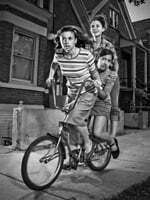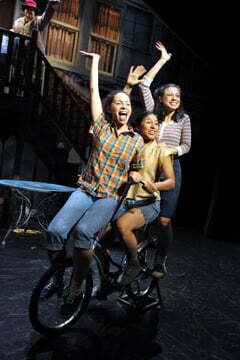The House on Mango Street
Based on the novel by Sandra Cisneros

Adaptation and original music by Tanya Saracho
Directed by Hallie Gordon
Step from page to stage stumbles
Tanya Saracho deserves a world of credit for taking on the daunting task of adapting Sandra Cisneros’s House on Mango Street –- a series of semi autobiographical vignettes — into a 90-minute drama. Unfortunately, the material does not easily lend itself to a theatrical presentation.
The book’s selection for the Spring 2009 Chicago Public Library’s One Book/One Chicago initiative recognizes its universal appeal, and there is no question that the subject matter is of especial interest to its intended, young-adult audience. This coming of age story is rife with a search for identity amidst the struggle of alienation. The House on Mango Street provides an exploration of neighborhood and community, and the play brackets this with opening and closing songs (sung by the full cast) which trace a Mexican-American family’s journey from renting in familiar Chicago residential areas – from Loomis Ave. to Keeler and Paulina – before they actually buy a house on Mango. This run down, shabby dwelling, however, is not the house of anyone’s dreams and the central character, young teen Esperanza (Sandra Delgado), struggles to surmount her disappointment.

We see her interact with potential girlfriends Lucy (Belinda Cervantes), and Rachel (Christina Nieves) as they jump rope and chip in to buy a bike; we endure her tiffs with big brother Carlos (Tony Sancho), and reluctance to babysit little sister Nenny (Gina Cornejo). In addition, we watch the young girls react to being mistaken for more mature women. The friends try on high heels, mutually appraise and praise their long legs, and then scamper off in dismay when approached by a lecher. Only Esperanza keeps the shoes – the others cannot wait to toss them away. This is a memorable scene. Others, however, are not as successful, often moving far too slowly.

There are also moments of plot confusion: After Esperanza takes up with sexually more mature Sally (Cervantes) and is assaulted (off stage), we next see her heading with her mother (Mari Stratton) to attend a baby’s funeral. For a split second, the possibility occurs that it might be her baby. It isn’t, but her reaction to the baby who died – introduced quite briefly earlier in the play — is supposed to show an increased maturity when she rekindles her friendship with the infant’s big sister. This stretches the slim plot.
The 90-minute play seems much longer, dragging as Esperanza moves towards adulthood, and ending with a pat assertion that while she will ultimately be able to leave Mango Street, she will also yearn to return throughout her life.
Originally published in 1984, The House on Mango Street won numerous awards, leading to fellowships and grants from the National Endowment for the Arts and high acclaim for Cisneros’ talent.
In a post-performance discussion, a member of the audience asked how much Cisneros contributed to the Steppenwolf production. The answer was that she gave her blessing but nothing else. That’s a shame.
Somewhat Recommended
Reviewed by Beverly Friend, Ph.D.
Steppenwolf Young Adults Series, Steppenwolf Upstairs Theatre, 1650 N. Halsted, Call 312-335-1650 or www.steppenwolf.org tickets $20 ($15 for students), Fridays 7:30 p.m., Saturdays 3 and 7 p.m., Sundays 3 p.m., weekday matinee performances are available for school groups only (Tuesdays-Fridays 10 a.m.), through Nov. 8. Running time is 90 minutes without intermission.
